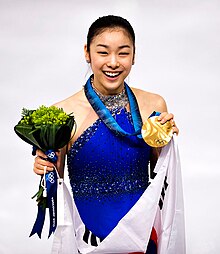
Yuna Kim, the retired South Korean competitive figure skater, also called "Queen Yuna" by figure skating fans and the press, has had an impact on the sport of figure skating, with her skating technique as an athlete and as an Olympic ambassador for both the 2014 and 2018 Olympic Winter Games. She was known for the "lighter-than-air grace in her movements on the ice",[1] as well as her jumps, her speed, and her grounding in the demands of the ISU judging system, as well as her execution of her triple Lutz-triple toe loop combination jump, her "signature" layover camel spin (called the "Yuna Camel"),[2] and her Ina Bauer. She trained with several coaches in her career, including Jong-hyun, Brian Orser, and Peter Oppegard. Her main choreographer was David Wilson, who helped her with her presentation skills and musicality. Kim was plagued with injuries throughout her career, which her training team tried to address, especially in the years leading up to the 2014 Olympics.
Kim was praised by reporters and by other members of the figure skating community for her artistry; she had "no rival in terms of artistry"[3] and music was as important a part of her skating as her elements were. As early as 2005, it was reported that Kim's success boosted the popularity of figure skating in South Korea, where she was called "Queen Yuna".[4][5] In 2010, she was the highest paid athlete at the 2014 Olympics. Her rivalry with Japanese skater Mao Asada was called "the best thing going in skating these days".[6]
Kim was instrumental in bringing the Olympics to Pyeongchang in 2018 and has been involved with the International Olympic Committee since 2010. She has received numerous awards and honours, and has been featured in several lists, including the Time 100 in 2010 and in Forbes lists between 2010 and 2018.
- ^ Hersh, Philip (February 25, 2010). "It's Kim Yuna and Everyone Else in Women's Figure Skating". Los Angeles Times. Archived from the original on June 10, 2010. Retrieved December 9, 2023.
- ^ "Yuna Kim, the Queen of the Rink". Olympic.org. International Olympic Committee. January 9, 2014. Archived from the original on May 19, 2014. Retrieved November 16, 2023.
- ^ Bae, Young-eun (March 26, 2009). "'피겨퀸' 김연아 '비장의 무기' 세가지" ['Figure skating queen' Yuna Kim's three 'secret weapons']. The Dong-a Ilbo (in Korean). Archived from the original on January 5, 2023. Retrieved November 16, 2023 – via Naver.
- ^ Limb, Jae-un (January 31, 2005). "Grace and Beauty, at a Price". Korea JoongAng Daily. Archived from the original on March 11, 2023. Retrieved September 25, 2023.
- ^ Hersh, Philip (February 25, 2020). "Ten Years Later, Queen Yuna's Iconic Crown Glitters with Transcendent Brilliance". NBC Sports. Archived from the original on October 31, 2022. Retrieved September 28, 2023.
- ^ "South Korea's Kim Crushes Competition". ESPN. Associated Press. March 29, 2009. Archived from the original on November 9, 2013. Retrieved November 20, 2023.
